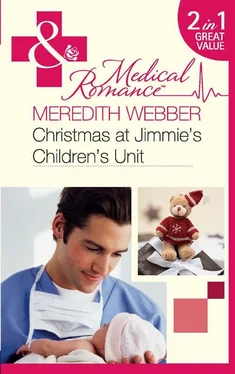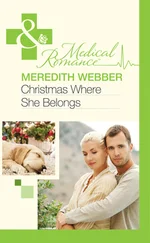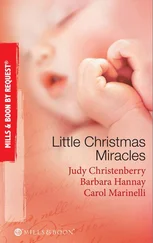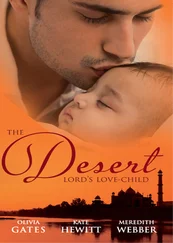1 ...7 8 9 11 12 13 ...17 Now Mrs Stamford was crying, too, and Kate quietly backed out of the room, wanting to leave the pair of them to comfort each other—and to get to know their little son.
Bob!
Angus returned as she was standing by the main monitors in the PICU. He peered into the room where the couple were, then turned to Kate, his eyebrows raised.
‘They’re okay,’ she told him. ‘They’ve called him Bob.’
‘Bob?’ Angus repeated. ‘Ah, after a grandfather no doubt.’
‘After their old dog,’ Kate corrected, then she laughed at the expression on Angus’s face. ‘Thinking how it would be to have a child called McTavish?’ she teased, and although he smiled, once again the smile didn’t reach his eyes.
‘I meant it when I said earlier there’d be no more children in my family,’ he said, and Kate sensed he was telling her something else.
Telling her he, too, felt an attraction between them but it couldn’t be?
She was not sure, but her body seemed to take it that way, disappointment forming a heavy lump in her chest.
‘HIS name’s Pete—Mr Stamford, that is,’ she said to Angus, anxious to get him out of her company. ‘I’m sure he’d appreciate meeting you and talking to you about the op and Bob’s expected progress.’
Her tongue stumbled over ‘Bob,’ and Angus smiled at her, restarting all the sensations she didn’t want to feel. Surely if she ignored them they’d go away, and for all the fancy she’d had earlier, she doubted Angus would be attracted to her. Especially not with a beauty like Clare around.
Or perhaps he no longer felt attraction for anyone. Perhaps his adamant declaration that Hamish would be an only child was because he was still in love with his dead wife—that was a possibility.
In which case he should do something to dampen down his attractiveness, Kate thought gloomily.
He walked away and she looked through the window to where he stood, talking to Pete and Mrs Stamford, and though she couldn’t hear what they were saying, in her imagination she heard his seductive accent and knew ignoring the manifestations of attraction would be difficult to do.
Perhaps an affair—
He’s not interested in you!
One part of her head was yelling at the other part. She tried to remember back to lectures on the brain and which bits controlled what. She’d never been particularly interested in neurology and worked quite happily on the theory that half her brain did emotion while the other half did common sense. And while the common-sense half—maybe that part was more than half in her case—usually held sway, she knew once the emotion part was awoken, it could be difficult to ignore.
Double damn again.
‘You talking to yourself?’
The nurse sitting at the monitor looked up and Kate realised she’d sworn aloud.
‘Probably,’ she told the nurse. ‘Early dementia setting in.’
‘Not surprising, the work you do, anaesthetising tiny babies. I couldn’t do it. I find it hard enough to watch them on the monitor. I’m getting married next week and we want to have kids, but I’ll have to transfer out of the PICU before I can even think about it. Pregnancy’s scary enough without knowing all the things that could be going wrong with the baby!’
Kate watched the monitor and considered this. It was what she did, caring for babies during lifesaving operations, so she’d always seen the work as positive, but as Angus and the Stamfords left Bob’s room and she returned to it, she wondered if knowing the things that could happen would make pregnancy better or worse.
Better, surely, for there would be no unknowns.
But had she chosen it, subconsciously steered her career this way, because of the baby she’d lost?
No, that had been back in second year at university, before she’d begun her medical training, when medicine had still been only one of the options she’d been considering.
But her affinity for babies came from somewhere…
She shook her head, shaking away thoughts that had been safely locked in some dusty closet in her mind for many years.
‘You handled Mrs Stamford very well. Are you able to feel that empathy for all your patients’ parents?’
Angus appeared when Kate, some hours later, was in the surgeons’ lounge checking the operating list for the following day, baby Bob now in Clare’s care.
Kate turned towards him, but though looking at him usually produced a smile, this time it was forced.
‘That’s a strange question,’ she told him, still puzzling over the man who’d asked it. ‘I would think anyone would feel empathy for someone with a sick child.’
‘Perhaps!’ He shrugged off her assertion with that single word, as if to say he didn’t, but she’d seen glimpses of an empathetic man behind the cool detachment he wore like a suit.
Or maybe armour?
‘Not “perhaps” at all,’ she argued. ‘I bet you feel it or have felt it. In fact, I’d like to hazard a guess it’s because of the children you see with problems that you’ve decided not to have more children.’
‘You couldn’t be more wrong.’
The blunt statement struck her like a slap and she felt the colour she hated rising in her cheeks. He must have seen it, for his next question was conciliatory, to say the least.
‘But on that subject, you see these infants yourself, yet you still want to have children. Why’s that?’
He’d asked the question to turn the conversation back on her, Kate knew that, but it was something she’d been thinking about since talking to the nurse earlier at the monitors. She’d locked the memory of her unborn child back into that dusty closet where it belonged, but the other issue was, and always had been, family.
How could she explain the loneliness she’d experienced as a child, and the ache for family, accentuated this time of year as Christmas drew near? Oh, she had friends who always welcomed her, but Christmas was for families, and since she was a child, she’d dreamed that one day she’d be the one cooking the turkey—she’d be the one with the children…
Pathetic, she knew, so she answered truthfully—well, partly truthfully.
‘It’s more a family thing,’ she admitted. ‘I was—I was an only child of parents who had no siblings living in Australia so I had no cousins or aunts or grandparents. Then one day—’
‘When you were eleven,’ he interrupted, and she nodded.
‘—I was staying with a friend and we went to her grandmother’s sixtieth birthday party and I saw a family in action and knew it was what I wanted.’
She kept her eyes on him as she spoke, daring him to laugh at her, wondering why the hell she was pouring out these things to a virtual stranger when she’d held them close inside her lonely heart for all these years!
He didn’t laugh, but nor did he respond, the silence tautening between them.
‘Besides,’ she said, determined to get back to easy ground, ‘why wouldn’t I want to pass on the genetic inheritance of pale skin and red hair—so suitable to a hot Australian climate.’
Now he did respond, even smiling at the fun she was poking at herself.
‘Ah, selective breeding. I do agree with that, but you could do that with one child—even be a grandmother with one child—so why children plural.’
Now Kate’s smile was the real deal, and she shook her head as she replied.
‘You’re a persistent cuss, aren’t you? We barely know each other and you’re asking questions even my best friends don’t ask. They just accept—Kate, yes, the one who wants kids. They usually emphasise the want and sigh and roll their eyes because they already have children and are often wondering why on earth they thought it was such a good idea.’
Читать дальше












